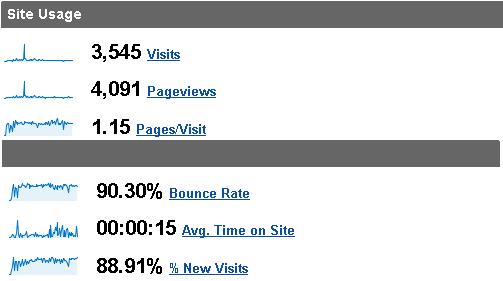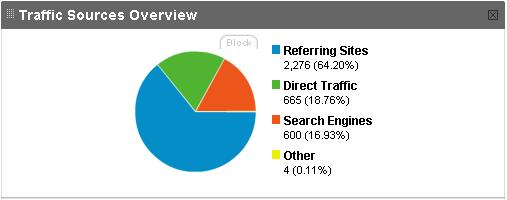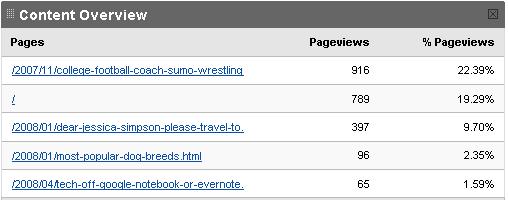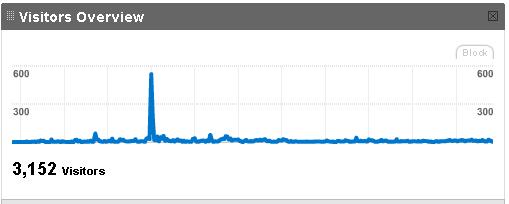Monday, July 21, 2008
"Hack" has to go
It's nearly impossible to go a day without reading a post on how to "hack" something. "Hack how you polish your shoes", "Hack your hackysack", "Hack your cousin Jack", etc.
We get it. If you have a blog, you feel really really cool if you can put "hack" into the title.
No mas.
Saturday, July 19, 2008
Thursday, July 17, 2008
Great unintentional comedy - sport headlines
\\Bucks sign G Lue and F Allen
Seattle Post Intelligencer -4 hours ago
Milwaukee, WI (Sports Network) - The Milwaukee Bucks signed guard Tyronn Lue and forward Malik Allen to undisclosed contracts on Thursday.
Bucks sign G Lue, F AllenNational Post
Bucks sign Tyronn Lue and Malik AllenBucks.com Boston Globe -Milwaukee Journal Sentinel -Rotowire -Most Valuable Network
Friday, July 11, 2008
Dear Google Reader - part 2
Why does hitting "Star" in GReader Mobile cause the whole page to reload?
Why are you sapping my precious phone battery?
Why are you pumping up my monthly bandwidth load?
Why are you testing the quality and speed of my data connection?
Why are you wasting my TIME?
Clicking on "star" should only result in a data push, not a pull.
PS: why can't I view all my starred items in GReader Mobile????
Sent via BlackBerry by AT&T
Thursday, July 3, 2008
"The statesman, the lawyer and the marketer" - more businessy gobbledy gook
He says recommending the right product/service that isn't yours to a customer will improve your business, grow market share, etc. PROVE IT. I hope that it is true, but unless he has stats, this is just gobbledy gook feel good business shaman talk.
 There aren't so many statesmen. People who speak truth to power. Leaders who describe what they see, whether or not it serves their short-term interests. They say what needs to be said, do what needs to be done, as long as it serves the long-term needs of their constituents. No wonder we like them so much.
There aren't so many statesmen. People who speak truth to power. Leaders who describe what they see, whether or not it serves their short-term interests. They say what needs to be said, do what needs to be done, as long as it serves the long-term needs of their constituents. No wonder we like them so much.
Subscribe to Seth's Blog using Google Reader
Overheard at the office, part 1
"No it is not."
"Yes it is."
"That's like saying bald is a hair style."
Hilarious.
250 posts
Let's start with the gross number of visitors etc:

3545 seems like a decent number, so does 4081. 1.15 pages/visit though basically means people come and then leave. And the bounce rate hold that up. And they only stay for 15 seconds. And 88.91% means they don't really come back much.
But, given the number of views and posts, I'm averaging 16.34 views per post. That's not too shabby for a useless blog.
Gotta work on repeat customers and "longevity" (maybe I'll ask people to think of Margaret Thatcher naked on a cold day; that's a movie quote people, I'm not a weirdo).
Where do the quickly disgusted readers come from?

That graph is a little misleading. Almost all the traffic came from Sports Illustrated on a single post. What's that? I got reference by the greatest sports magazine of this or any time? Something like that.

22% of my pageviews came from a post I did making fun of fat college football coaches. Another 9.7% came from a post I did about Jessica Simpson being a jinx on the doodie-head Dallas Cowboys.
So what was the overall traffic pattern? It was not like LaGuardia around Christmas. It was more like Topeka, Kansas around the 9th of August:

See that Washington Monument looking spike? That's what I like to call the "Sports Illustrated Bump". Which is different from a "baby bump" and nothing like the famed "Colbert Bump".
So what have we learned? Nothing. But I did note that a few people read here. I posted more times than m' lady would probably have liked, and maybe three or four posts were worth it (one of which was when I complained about a financial planning tool, Mint.com, and got a response from their Lead Designer)
Wednesday, July 2, 2008
"Do We Need Weekends?" - rather, let's ask 23 year olds to shape businesses
Here was my take -
A general comment: Why do "we" (specifically many HBR bloggers) look to Gen Y as the source of how businesses should change? At least a freshly minted MBA with few years experience has studied business with modest focus. Reflexively looking to the newest entrants into the market isn't per se the source of panacea.
Specifically, why do we wait till we are assembled to share info: History for one, prior to recently there were not efficient methods of sharing info with large audiences within an organization; efficacy is another, just because you post something on a wiki doesn't make it meaningful to all, there might be critical context missing from a wiki (such as relevant background info someone who has been with the company a year might lack); context, body language is still THE critical communication factor, smiley faces don't accurately convey this; habit is a lesser valid reason, but provides a reason why.
Just because a Gen Y'er wants to change the company, doesn't mean the other 98% of employees will work effectively or efficiently in the same model.
Got your attention with that one, didn't I?
Let's talk some more about redesigning our organizations – "hacking" the enterprise. Here's another fundamental assumption upon which our organizations are built that I think has got to go: weekends.
No, I'm not arguing that we should all work seven days a week. But I do think that the idea of a corporation telling us which days to work (and when to "rest") is outdated.
The idea of a defined work week makes great sense if you're performing synchronous tasks – activities in which everyone has to be there all together to get the work done. Clearly in an industrial economy, the idea that everyone needs to be there pretty much at the same time is key. You can't run an assembly line if the guy responsible for tightening the bolts has decided to skip Friday and come in all alone on Saturday.
But how much of our work today, really, is synchronous?
Less and less. Yes, there certainly are a number of customer-facing roles for which you clearly have to be available when the customers are there. But an increasing proportion of the economy is comprised of work that is individually paced. We may confer with colleagues to get input, but for more and more of us, a colleague's decision to take the day off will have little direct affect on our immediate productivity.
...And the Gen Y's I interview who have been in corporations for a year or so, almost universally, comment on how inefficient they find current corporate habits to be. Why do people wait to share ideas or get input until they can physically assemble, when it's now possible to use social networking tools to gather input quickly – and asynchronously? Why do we spend much of our synchronous time together simply updating each other on our activities when any 20-year-old on Facebook can tell you how much easier and faster it is to do this with Web 2.0 tools?
